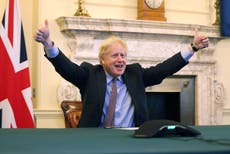Brexit deal: EU member states give unanimous backing to agreement
Move means agreement can come into force on New Year's Day – even though European Parliament will not vote until February
Your support helps us to tell the story
From reproductive rights to climate change to Big Tech, The Independent is on the ground when the story is developing. Whether it's investigating the financials of Elon Musk's pro-Trump PAC or producing our latest documentary, 'The A Word', which shines a light on the American women fighting for reproductive rights, we know how important it is to parse out the facts from the messaging.
At such a critical moment in US history, we need reporters on the ground. Your donation allows us to keep sending journalists to speak to both sides of the story.
The Independent is trusted by Americans across the entire political spectrum. And unlike many other quality news outlets, we choose not to lock Americans out of our reporting and analysis with paywalls. We believe quality journalism should be available to everyone, paid for by those who can afford it.
Your support makes all the difference.The Brexit trade deal has moved a step closer to being passed, with unanimous approval granted by EU member states.
Germany's spokesman hailed the “green light” after their ambassadors backed a provisional application of the agreement, struck on Christmas Eve.
The move means the agreement can come into operation on New Year's Day – even though the European Parliament will not give its approval until February.
On Wednesday, the House of Commons is certain to back the agreement, with Labour voting in favour alongside the government, despite its sharp criticisms of the “thin” deal.
It will be rushed through Parliament in a single day, despite criticism that the 1,255-page text will escape proper scrutiny – with the Bill itself yet to be published.
The agreement softens the economic damage from leaving the EU – by avoiding having no deal at all – but is still expected to lower GDP by between 4 and 5 per cent, over 15 years.
It means Britain and the 27-nation bloc can continue to trade in goods without tariffs or quotas, but cross-Channel traders face a mountain of costly new red tape from 1 January.
The livelihoods of professionals are threatened because their qualifications will no longer be recognised in the EU and the City of London has been left in limbo.
There is also growing anger that the government has “betrayed” the fishing industry by failing to gain control of stocks in UK waters, as it repeatedly promised.
The UK conceded to the EU’s demand to give up only 25 per cent of the value of its catch, at the end of a five-and-a-half-year transition – setting the scene for a future bitter dispute.
Michael Gove denied that businesses would face “more paperwork, bureaucracy, cost and faff” from the abandoning of frictionless trade, with departure from the single market and customs union.
“Businesses will need to make sure that they’re ready for new customs procedures and we, as individuals, will need to make sure that our passports are up to date – because they need to have at least six months before expiry on them in order to be able to travel abroad,” the Cabinet Office minister said.
“I'm sure there will be bumpy moments, but we are there in order to try to do everything we can to smooth the path,” he told the BBC.
The European Research Group (ERG) of hard Brexit-backing Conservative MPs is still examining the text, but is increasingly expected to back the deal on Wednesday.
But Keir Starmer is facing the possible loss of some of his pro-EU shadow ministers, who may defy his order to do the same.






Join our commenting forum
Join thought-provoking conversations, follow other Independent readers and see their replies
Comments